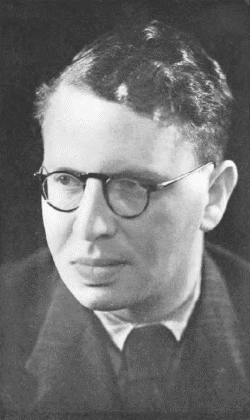

Queer Places:
Markt 27 6041 EM Roermond, Netherlands
 Jacob Hiegentlich (30 April 1907 – 18 May 1940) was a gay Dutch poet of Jewish descent. He committed suicide in 1940, at age 33,[1] days after the German invasion of the Netherlands.
Jacob Hiegentlich (30 April 1907 – 18 May 1940) was a gay Dutch poet of Jewish descent. He committed suicide in 1940, at age 33,[1] days after the German invasion of the Netherlands.
Hiegentlich was born on 30 April 1907 in Roermond, one of five children of Rosalie Egger (died 1927) and Sallie Hiegentlich, a trader in textiles. Four of the children and the father did not survive World War II. Jacob grew up in the Catholic city of Roermond in what he later called "a confusing mix of Roman Catholicism and Jewishness". He attended gymnasium at the Bishop's College Roermond [nl], but did not graduate—he had problems with math.[2] Jews in Limburg did not suffer the same antisemitism as Jews in other parts of Europe.[3] Still, while they were nominally granted the same rights as non-Jews, they were nonetheless marked as different, insulted, and ostracized; Hiegentlich sketches their position in the partly autobiographical novella Mirjam.[4] He wrote and published his first novel at age 17, under the pseudonym David Jozua de Castro; Het zotte vleesch. Roman van 't Limburgse volk ("The foolish flesh: novel of the people of Limburg") featured an unflattering portrait of a friend of his father, who bought up the entire printing. At his father's insistence he got a degree in Dutch in Amsterdam, graduating on 17 November 1930. In that city he was a member of the Nederlandse Zionistische Studenten-Organisatie (NZSO), and hung out with artists and bohemians, in a group named the Reynderskring for a café on the Leidseplein.[2] In 1932 he got a job as a teacher at a theosophical lyceum in Naarden, but his strong individualism did not go together well with the classical system of education, and after 1935 he devoted himself exclusively to being a writer. He remained an enthusiastic Zionist, and opted for the militant branch led by Ze'ev Jabotinsky. He wrote for Jewish and Zionist magazines, including Baderech, Hatikwah (the official publication of the NZSO), and Ha'Ischa. For the Joodsche Wachter, the official publication of the Dutch Zionist Union [nl], he wrote political articles that warned against the coming of Nazism. He also wrote book reviews, greatly admiring Jacob Israël de Haan and Carry van Bruggen. He lectured on literature and Judaism, and published novels, novellas, essays, and poetry.[2] The outbreak of World War II proved lethal to a generation of Dutch writers—some were killed, some killed themselves, some died as a result of wartime accidents; Hiegentlich was one of many.[5] On the evening of 14 May 1940 he took poison, and was taken, unconscious, to the Wilhelmina Gasthuis, where he died on 18 May, at age 33.[2]

On the façade of his parental home at the Markt 27 in Roermond, there is a memorial plaque for Jacob Hiegentlich, ’Writer from Roermond‘. An anthology of his work with an extensive biography was edited by Dr. Catharina Ypes, and published as 1907–1940. Een joods artist tussen twee oorlogen by L.J. Veen, Amsterdam, in 1949.[9] He makes an appearance in the novel Sunken Red by Jeroen Brouwers, who also devoted a chapter to him in his De laatste deur ("The last door"), a study of Dutch writers who committed suicide.[10]
About Jacob Hiegentlich, Siegfried E. van Praag said, among other things: ’Whenever I go to Amsterdam, I miss him. He can no longer be found in Reijnder's artists' pub at the Leidsche Plein, nor in his room at the old canalside house. He no longer pours Bols in the liquor glass of his coincidental landlady while playing a typical, little known record on his gramophone. And he no longer holds heavy cigars in the lips of that eternally boyish face. ( ) Granted, Hiegentlich's dress sense was conspicuous through his tendency for dandyism, his yearning for the boulevard elegance of the old days. Despite the feminine side of his inner life which he probably indulged in this way, he loved bravado. His sense for bravado and his conscious Zionism forbid him to hide his personality and his Jewish background.‘
My published books: